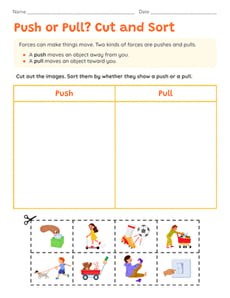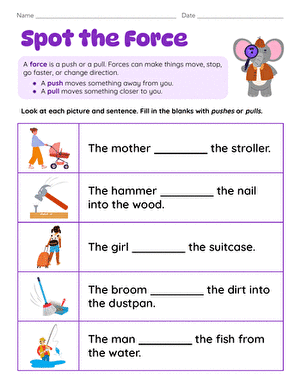1st Grade Forces and Interactions Worksheets
About 1st Grade Forces And Interactions Worksheets
On Education.com, 1st grade forces and interactions worksheets introduce young students to the basic concepts of pushes, pulls, motion, gravity, and friction through fun and engaging activities. These printable lessons help children observe and understand how forces affect objects in everyday life, using exercises like identifying force direction, matching forces with objects, and drawing conceptual illustrations.
Education.com provides a variety of resources, including worksheets, hands-on activities, interactive games, and lesson plans categories that focus on the fundamental principles of forces and motion. Each resource supports early science learning, enables parent and teacher involvement, and makes it easy to structure classroom or home lessons that build foundational physics skills.
Parents and educators can use these resources to create structured and spontaneous lessons alike. With printable worksheets, children can practice observing forces in real-world examples, while activities like writing and drawing reinforce both science and fine motor skills. This collection offers versatile, accessible materials to help first-grade students explore physics concepts clearly and effectively.
Education.com provides a variety of resources, including worksheets, hands-on activities, interactive games, and lesson plans categories that focus on the fundamental principles of forces and motion. Each resource supports early science learning, enables parent and teacher involvement, and makes it easy to structure classroom or home lessons that build foundational physics skills.
Parents and educators can use these resources to create structured and spontaneous lessons alike. With printable worksheets, children can practice observing forces in real-world examples, while activities like writing and drawing reinforce both science and fine motor skills. This collection offers versatile, accessible materials to help first-grade students explore physics concepts clearly and effectively.





